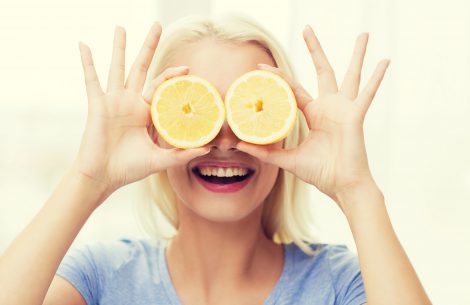Protect our vision is crucial because eyesight is something most of us take for granted, at least, until there is a problem. And the potential for vision problems and eye diseases only increases with age. While modern medicine offers many ways to deal with age-related macular degeneration (AMD), glaucoma, cataracts and more, it’s easier, more pleasant and more affordable if your eyes stay healthy.
While many factors affect eye health, especially as you age, there are natural ways to protect the eyes. Here are three non-invasive ways to protect them.
Diet
“Eat your carrots.” It’s what mothers and grandmothers have said for decades and it’s true. Carrots provide beta-carotene and vitamin A, both essential nutrients for eye health. More recently, we’ve discovered two important carotenoids that play a vital role in eye health: lutein and zeaxanthin.[1]
Specifically, lutein and zeaxanthin have been linked to a reduced risk of age-related macular degeneration and cataracts.[2] These two compounds have been shown to have powerful antioxidant effects, especially for the eyes. Research suggests they protect the retina and other structures in the eye against oxidative damage.
The best sources of lutein and zeaxanthin include[3]:
- Dark leafy greens like kale and spinach
- Green peas
- Yellow squash
- Pumpkin
- Brussel sprouts
And, of course, carrots are also a great source of these two powerful antioxidants. But foods with lutein and zeaxanthin aren’t the only ones that support eye health. Foods with lycopene, another carotenoid with antioxidant properties also helps keep eyes strong.
Research has suggested that lycopene protects the retina.[4] Research has also shown it reduces the risk of age-related macular degeneration and may prevent cataracts.[5],[6]
Like lutein and zeaxanthin, lycopene can be found in red, orange and yellow fruits and vegetables. Great dietary sources of lycopene are[7]:
- Tomatoes
- Red peppers
- Papaya
- Watermelon
- Grapefruit
Vitamin E has also been shown to promote healthy eyes and strong vision.[8]
Herbs
Herbs offer another great source of nutrients to support eye health. Traditional Chinese Medicine (TCM) has used several herbs for centuries to help protect the eyes. The most common herbs used to treat eye problems are Chrysanthemum flower, Celosia seeds, Notoginseng, Buddleia flower bud and Lycium fruit.[9]
Chinese Herbal Medicine isn’t the only tradition that has found herbs to support the eyes. In Europe, people have used bilberries for centuries to support eye health. In fact, during World War II, British pilots ate bilberry to help their night vision. Bilberries contain anthocyanins, the same antioxidants found in blueberries.
Other herbs like gingko biloba have been used to support eye health by promoting blood flow, an essential part of retina health. Research indicates combining an herb like gingko that promotes healthy blood flow with nutrients like vitamin A, lutein, and vitamin E improve vision and can help prevent eye diseases like AMD.[10]
Acupuncture
The Chinese practice of acupuncture has also been shown to support eye health. Research has shown that the stimulation of specific acupuncture points does increase blood flow to the eye. According to several studies, acupuncture helps patients with AMD, dry eyes and may even offer support for glaucoma patients.[11]
References:
- Abdel-Aal E-SM, Akhtar H, Zaheer K, Ali R. Dietary Sources of Lutein and Zeaxanthin Carotenoids and Their Role in Eye Health.Nutrients. 2013;5(4):1169-1185. doi:10.3390/nu5041169.
- Ibid.
- https://www.myfooddata.com/articles/high-lutein-and-zeaxanthin-foods.php
- https://www.cambridge.org/core/services/aop-cambridge-core/content/view/S0007114506002741
- Nicolas Cardinault, et al. Lycopene but not lutein nor zeaxanthin decreases in serum and lipoproteins in age-related macular degeneration patients. Clinica Chimica Acta, Volume 357, Issue 1, 2005, Pages 34-42, ISSN 0009-8981, https://doi.org/10.1016/j.cccn.2005.01.030.
- Suresh Kumar Gupta, et al. Lycopene attenuates oxidative stress induced experimental cataract development: an in vitro and in vivo study. Nutrition, Volume 19, Issue 9, 2003, Pages 794-799, ISSN 0899-9007, https://doi.org/10.1016/S0899-9007(03)00140-0.
- https://www.myfooddata.com/articles/high-lycopene-foods.php
- https://www.aoa.org/patients-and-public/caring-for-your-vision/diet-and-nutrition/vitamin-e?sso=y
- https://www.pacificcollege.edu/news/blog/2015/03/05/reaching-optimal-eye-health-chinese-medicine
- Moshetova LK, et al. [Results of the use of antioxidant and angioprotective agents in type 2 diabetes patients with diabetic retinopathy and age-related macular degeneration]. [Article in Russian; Abstract available in Russian from the publisher] Vestn Oftalmol. 2015 May-Jun;131(3):34-44. doi: 10.17116/oftalma2015131334-44.
- https://www.naturaleyecare.com/blog/preserve-vision-chinese-medicine/

